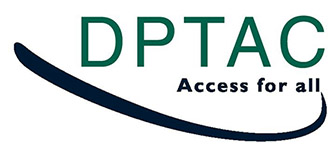DPTAC position on face coverings and exemptions
Published 22 March 2021
The Disabled Persons Transport Advisory Committee (DPTAC) was established under the Transport Act 1985 and is the government’s statutory adviser on issues relating to transport provision for disabled people.
DPTAC’s vision is that disabled people should have the same access to transport as everybody else, be able to go where everyone else goes, and do so easily, confidently and without extra cost.
About face covering exemptions
Due to the current coronavirus (COVID-19) pandemic, there is a current requirement, by law, for face coverings to be worn on public transport, unless you are exempt from doing so.
Current exemptions to this law include but are not limited to:
people who cannot put on, wear or remove a face covering because of a physical or mental illness or impairment, or disability
and
where putting on, wearing or removing a face covering will cause you severe distress
This is DPTAC’s position statement about face covering exemptions, which looks at how disabled people can be helped to feel confident when travelling during the COVID-19 pandemic.
Public awareness
Public messaging about exemptions has improved considerably.
The Department for Transport (DfT) carried out a trawl of industry and other messaging on face coverings with a view to getting consistency and clarity of messaging; however, despite this, not all members of the public appreciate that some people are exempt from wearing face coverings.
There have been several well-publicised instances in which somebody (often a member of the public, but sometimes a member of transport staff) has been aggressive to another about the need to wear a face covering.
DPTAC acknowledges that there will always be people who simply refuse to wear a face covering and claim exemption even though this is not legitimate, but this seems to be a very small minority – albeit usually high profile in terms of media coverage. We do not believe the acts of this small minority should drive an aggressive or unnecessarily challenging approach towards those who claim an exemption legitimately.
While many people claiming exemption may choose to carry proof, with some choosing to wear a visible sign of exemption such as a sunflower lanyard, DPTAC strongly believes that disabled people claiming exemption should not be required to provide proof.
Our advice is to make it easy for people to self-identify – if they choose to – by using a visible sign of exemption, for example, a lanyard or a travel exemption card. It is evident that more and more disabled people are using these tools and the public, in general, are becoming more aware of them; however, we also believe it is important that those who choose not to self-identify are not required to do so and are not penalised for choosing not to.
DPTAC would like to see a high-level public campaign that delivers a succinct message detailing why face mask exemptions exist, and what to look out for (such as sunflower lanyards) as an indicator of a reason for exemption, without needing to explain or justify not wearing a face mask. The campaign would need to make clear that not everyone will choose to use a visible sign of exemption, and that’s okay.
Enforcement
DPTAC is aware of evidence – anecdotal or reported in the media – of cases where other passengers are taking the law into their own hands and aggressively challenging disabled people who are not wearing face coverings.
This could be because they are not aware that there are exemptions, or what those exemptions are. They may not have the understanding that it may be impossible for some people to wear a face covering, and they may not know what lanyards and other exemption cards signify. They also might not understand that if they aggressively challenge people not wearing face coverings, they themselves could be committing an offence either as an assault or hate crime.
DPTAC believes that a much tougher line needs to be taken against those passengers who are aggressive towards or otherwise abuse those without face coverings.
The impact of aggressive challenges – and even the fear of being challenged – is to unfairly discriminate against people who have legitimate reasons not to wear a face covering. It raises levels of anxiety and discomfort among disabled people, and discourages many from using transport, effectively excluding them from society.
We would like all passengers to understand that it is for transport professionals, the police and other enforcement authorities to interact with those not wearing face coverings to determine whether an exemption applies. DPTAC hopes these staff will be encouraged to frame their conversations in an open and curious way, rather than antagonistically.
Under the Equality Act 2010, people with protected characteristics such as a disability have every right to go about their lives without harassment.
Training
DPTAC is not yet confident that all transport staff have a good enough awareness of how some disabilities might impact on the ability of individuals to wear a face covering.
This could be improved by further training, which includes the views of those with lived experience, and targeted and consistent messaging. There needs to be a consistent approach taken across different transport modes and even different operators in the same mode.
Summary
It is not an easy thing to balance the public health requirements of protecting everyone against the spread of COVID-19 with the legitimate right of some disabled people to continue to legally access goods and services, including the right to use transport despite not wearing a face covering.
It is unfortunate that some people with legitimate exemptions have been concerned about going out without a face covering, and this needs to change.
Passengers need to understand and trust that if they see others without face coverings, it is because they are likely to have a legitimate reason and must be allowed to travel.

